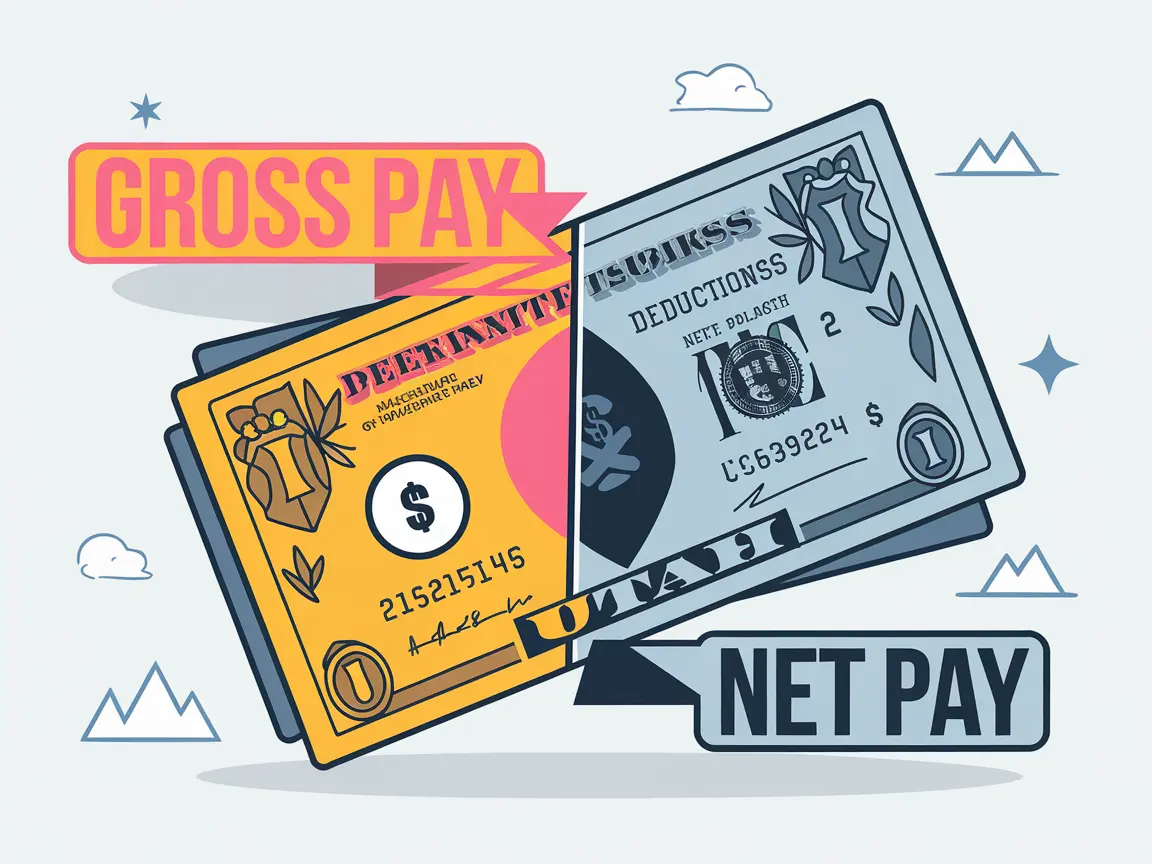When I first landed my job in Utah, understanding my paycheck felt like learning a new language. I had never encountered a paycheck calculator before, and let me tell you, it was a rollercoaster of confusion. Little did I know, there were tools designed to help locals like me decipher the intricacies of paycheck deductions, taxes, and take-home pay. This blog is a culmination of my journey, highlighting the best Utah paycheck calculators and sharing some tips I stumbled upon along the way.
Why use a paycheck calculator in Utah?
Have you ever wondered how much of your paycheck actually ends up in your pocket? Understanding the difference between gross pay and net pay can be tricky. That’s where a paycheck calculator comes into play. Let’s explore why using one in Utah is important.
1. Understand Gross vs. Net Pay
Gross pay is the total amount you earn before any deductions like taxes, insurance, or retirement contributions. Net pay, on the other hand, is what you take home after all these deductions. Knowing this difference is crucial. If you think you’re making $70,000 a year, but your take-home amount is drastically lower—say, due to taxes—you might feel disappointed. A paycheck calculator lets you assess this easily.
2. Stay Informed on State Tax Rates
In Utah, there’s a flat income tax rate of 4.95%. This means everyone pays the same percentage. However, local taxes can vary significantly, depending on where you live. Without proper calculations, you might find yourself in a bind during tax season. Staying informed using a paycheck calculator can save you from surprises.
3. Calculate Deductions Accurately
Deductions aren’t just taxes. Depending on your situation, you could have health insurance, retirement plans, or other contributions taken out. Understanding precisely how these affect your paycheck is vital. A calculator helps ensure you account for all deductions accurately, which can prevent budgeting issues.
4. Ensure Compliance with State Regulations
Utah has specific payroll regulations that companies must follow. Failing to comply can lead to penalties—not just for your employer but for you too. By accurately calculating your pay and understanding the related laws, you help ensure everything is above board.

“Paycheck calculators are essential tools for employees to understand their earnings and deductions.” — Emily Martinez, Payroll Specialist
Chart: Salary and Tax Impact in Utah
| Aspect | Range |
|---|---|
| Average Salaries | $50,000 – $70,000 |
| State Income Tax Impact | Approx. 30% of paycheck |
Using a paycheck calculator helps clarify the differences between gross and net income. It also highlights the various deductions applicable in Utah. So why not give it a try? It could turn out to be an invaluable tool for managing your finances.
Top Utah Paycheck Calculator Tools
When it comes to managing personal finances, having the right tools makes all the difference. In Utah, finding an accurate paycheck calculator can help you understand your earnings and tax deductions better. Let’s explore some of the top tools available.
1. Review of Popular Calculator Tools
Two calculators often praised are ADP and PaycheckCity. Both are user-friendly and provide fast results. With so many options out there, it’s essential to choose the best ones.
2. User-Friendly Interfaces
We all know how frustrating it can be to navigate a complicated calculator. A good paycheck calculator should be intuitive and straightforward. Like what
“A good paycheck calculator should be intuitive and straightforward.” — Mark Thompson, Payroll Consultant
said, simplicity is key.
3. Mobile App Availability
In today’s fast-paced world, having a mobile app is a huge plus. Many people like to check their finances on the go. Tools like ADP provide apps that let you calculate your paycheck conveniently, wherever you are. Isn’t that smart?
4. Feedback from Users
User reviews often highlight the effectiveness of these calculators. Many find them reliable and easy to use. A personal recommendation goes a long way in building trust. If a friend used it successfully, why not give it a shot?
Comparing Key Features
Let’s take a quick look at what ADP and PaycheckCity have to offer:
| Calculator Tool | Feature |
|---|---|
| ADP | Calculates average check in under a minute |
| PaycheckCity | Claims an accuracy rate of 98% |
As you can see, both tools offer unique advantages. Exploring these tech tools gives a clear advantage, especially when every cent counts in your monthly budget. Having accurate data helps you plan better!
Important deductions and state regulations to consider
When it comes to your paycheck, understanding deductions is crucial. These deductions can influence how much money you take home each month.
1. Social Security and Medicare Taxes
First and foremost, let’s talk about Social Security and Medicare taxes. Every employee contributes to these funds. For Social Security, the rate is 6.2% on earnings up to $142,800. This means if you earn above this amount, you won’t pay Social Security tax on the excess earnings.
On the other hand, the Medicare tax is set at 1.45%, with an additional 0.9% for high earners. How does that work? If your earnings surpass a certain threshold, you’ll pay more in Medicare taxes. Keeping track of these can help you plan your finances better.
2. Utah-Specific Tax Brackets
Each state, including Utah, has its own tax brackets. Understanding these can save you money. Utah’s tax system is straightforward. It has a flat income tax rate. Nonetheless, knowing which bracket you fall into can help you manage your deductions effectively.
3. Additional Voluntary Deductions
Don’t forget the potential for additional voluntary deductions. These can include retirement contributions, health insurance, and more. You might choose to set aside some of your earnings for a 401(k) or an IRA. Depending on your choices, this can impact your taxable income significantly.
4. Impact of Different Employment Types
How you are employed—hourly or salaried—can make a difference. For instance, salaried employees may have deductions that are calculated slightly different than hourly employees. This disparity is important to understand, especially when planning your budget.
As
“Being informed about deductions leads to better financial planning.” — Sarah Johnson, Financial Advisor
emphasizes, knowledge is power when it comes to your paycheck.
Each year, regulations can change. Staying updated on these can ensure that your paycheck calculations are accurate. This awareness can help maximize your earnings, allowing for better financial decisions down the road.
Creating a budget based on your take-home pay

When it comes to managing finances, creating a budget is crucial.
It gives you clarity on your spending and helps in saving for future goals.
Step-by-step budgeting guide
Starting a budget can be daunting, but breaking it down makes it easier.
- Determine your take-home pay: This is what you actually receive after taxes and deductions.
- List your fixed expenses: Think rent, utilities, and subscriptions. These don’t change much month to month.
- Track variable expenses: Groceries and dining out can vary. Keep receipts or use budgeting apps.
- Set your savings goals: Aim to save traditionally 20% of your income. Make saving a priority.
- Review and adjust: Regularly revisit your budget to ensure it aligns with your changing needs.
Tips on allocating funds effectively
Once you have your budget established, it’s time to think about how to allocate funds effectively. A common allocation strategy is the 50/30/20 rule:
- 50% for needs: This covers essentials like housing and food.
- 30% for wants: Enjoy life! This includes entertainment and dining out.
- 20% for savings: Build that emergency fund! Start with a goal of at least three to six months’ expenses.
Examples of common monthly expenses
Understanding typical monthly expenses helps in budgeting:
- Rent or mortgage payments
- Utilities (electricity, water, internet)
- Groceries
- Insurance (health, auto)
- Debt payments (student loans, credit cards)
The importance of an emergency fund
An emergency fund is not just a luxury; it’s a necessity.
Think about how stress-free it is to know you have a cushion during unexpected times.
Financial advisors recommend having three to six months’ worth of living expenses saved up.
“A well-structured budget can relieve financial stress and provide peace of mind.” — Jason Lee, Financial Coach
When you clearly understand your net income, budgeting becomes simpler.
Tools like paycheck calculators can help you figure out your take-home pay, making it easier to plan your budget effectively.
Personal Anecdotes and Commonly Asked Questions
Paychecks can be a source of stress. I remember the first time I opened my paycheck and felt a wave of uncertainty. Was the amount right? Had I miscalculated my hours? This experience is more common than we realize. It’s a journey full of twists and turns, and I’d love to share some of my story, along with common questions I’ve encountered about paycheck calculators.
My Journey with Paycheck Uncertainties
Every employee knows that feeling when payday rolls around. You check your bank, and dread fills you if there are discrepancies. I often found myself questioning:
- Did I account for my overtime hours?
- What about tax deductions?
In the early days, I avoided paycheck calculators. They seemed complicated and intimidating. But I quickly learned that they could make my financial life a lot easier. In fact, studies show that 75% of users found calculators less stressful after trying them. They really can help ease those paycheck anxieties!
Common Questions About Calculators
Many people ask: How accurate are these calculators? Well, they are designed to offer accuracy based on the information you enter. However, frequent mistakes arise, especially with miscalculating overtime pay. Make sure to enter the correct rate and hours worked!
Real-Life Scenarios Depicting Paycheck Issues
Let’s say you’ve worked hard all week. You put in those extra hours, only to discover—you guessed it—an error in your paycheck. It’s infuriating! Many readers share similar experiences, turning to each other for support and advice.
Encouraging Conversations with Readers
Inviting readers to share their own paycheck stories enriches the discussion and fosters learning. “Everyone’s paycheck story is different, but the tools can help guide us.” — Rebecca Allen, HR Manager. I love hearing feedback from you. What challenges have you faced? How did you navigate them?
When we talk about our paycheck journeys, we build a robust community. Engagement like this helps remind us we aren’t alone in our struggles.
In conclusion, whether you’re just starting your career or navigating complexities in your paycheck, remember: we all share common experiences. Embrace the tools available to you, ask questions, and let’s keep the conversation going. Understanding our finances is a journey worth taking together.
TL;DR: Utah residents can ease their payroll worries by utilizing specialized paycheck calculators. We’ve gathered the best tools, insightful tips, and important state regulations to help you navigate your payroll confidently.




